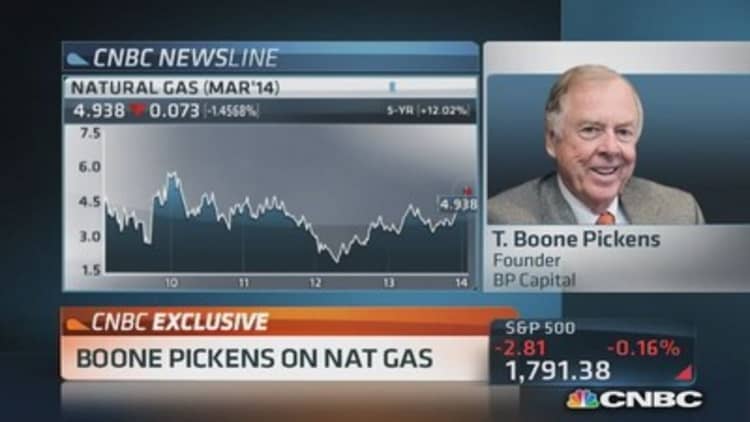Sayonara cheap natural gas?
A brutally cold winter has made natural gas the new black, firing up demand and sending prices to a four-year high last week at $5.74. The sharp rally has upended assumptions that a surplus of supplies would provide inexpensive energy for decades to come, and that the U.S. could even afford to ship some of it abroad.
For years, the market has grown accustomed to the idea that —a product of the U.S. shale revolution—is both abundant and inexpensive. The breakneck pace of U.S. natgas production, which the Energy Information Administration recently predicted would jump by 56 percent from 2012 to 2040, had helped depress prices.
(Read more: Cold blast pushes record natural gas demand)
At least for the moment, analysts expect the current price spike to be temporary: Goldman Sachs recently raised its natgas forecast for 2014 in response to the rally, but expects prices to top out at $4.50. Elsewhere, Bank of America-Merrill Lynch expects prices to fall back below $4 within the next two months.
Still, others say the natural gas spike could last longer than expected, because a prolonged cold spell has delayed the replenishment of depleted inventories. The latest report from the EIA showed natural gas stockpiles fell by 262 billion cubic feet (bcf), having shed 40 percent since November alone as the weather turned frigid.
"The relentless demand for gas is really taking storage way down," said Richard Hastings, macro strategist at Global Hunter Securities in an interview. "With the new run-up in demand ... there's not enough time to rebuild storage to bigger levels. This starts to create ripple effects in the entire natgas system."
That could put more upward pressure on prices, especially if the extreme cold extends through February and March. Markets may already be pricing in this possibility, with March natural gas futures trading at a premium to April contracts.
"We're looking at a situation where if we get another few weeks of this [cold weather], then get a very hot summer," it could push back the timetable to rebuild natgas inventories, Hastings said. That would send prices higher than expected throughout the summer."
(Read more: )
Despite the recent price spike, U.S. natural gas still trades at a deep discount to the overseas equivalent. On average, Europe pays more than $10 per million British Thermal Units (MMBtu), while prices top $15/MMBtu in Asia. Still, the surge complicates another aspect of U.S. energy prices—whether to export natural gas to thirsty markets abroad.
Can US still be a natgas exporter?

A major debate is underway over whether the world's second-largest energy consumer behind China has enough supplies to satisfy both domestic and international demand. Some groups disagree, such as America's Energy Advantage, a lobbying group that embraces shale fracking but wants stiff limits on shipping it offshore.
(Read more: Natgas exports become the next step in US energy evolution)
After greenlighting three new liquefied natural gas (LNG) export facilities in 2013, the Department of Energy is weighing whether to approve the 21 remaining terminals.
In a strongly worded letter last month, AEA urged Energy Secretary Ernest Moniz to proceed with caution—and linked the natgas spike to the DOE's approval of liquefied natural gas exports. Jennifer Diggins, the AEA's chair, called it a "dangerous policy path" that could inflict "irreversible harm" on the economy.
"Natural gas prices have already increased by nearly 30 percent since approval of the first LNG export terminal," Diggins wrote.
"America's Energy Advantage continues to believe that exporting this volume of natural gas carries unnecessary risk for job creation, a durable manufacturing recovery and consumer spending in our country by significantly raising prices for consumers and manufacturers," she added.
—By CNBC's Javier E. David.


